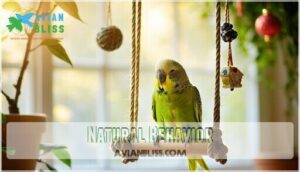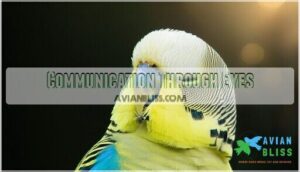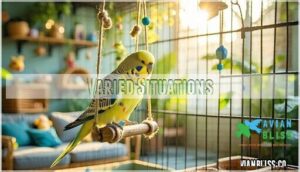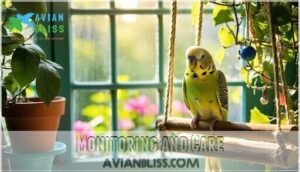This site is supported by our readers. We may earn a commission, at no cost to you, if you purchase through links.
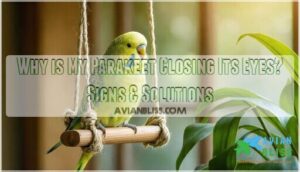
However, frequent eye closure during active hours can signal stress, illness, or discomfort. Watch for accompanying symptoms like fluffed feathers, lethargy, or changes in appetite.
If your bird’s closing their eyes constantly while awake, it’s time to consult an avian veterinarian. Sometimes, parakeets also close their eyes when they’re content during gentle petting or when they trust their surroundings completely.
Understanding these subtle eye signals can help you decode what your feathered friend is really trying to tell you.
Table Of Contents
- Key Takeaways
- Behavioral Cues When Touched
- Eye Cues and Emotional States
- When to Seek Veterinary Care
- Understanding Parakeet Eye Signals
- Frequently Asked Questions (FAQs)
- What does it mean when a parakeet closes his eyes?
- Why does my parakeet squint?
- Do parakeets sleep with their eyes closed?
- Why do parakeets have wide open eyes?
- What causes parakeet eye infections?
- Why do parakeets stop laying eggs?
- What does it mean if a bird keeps closing its eyes?
- What are the signs of a sick budgie?
- Why is my bird squinting his eyes?
- What does it mean when my parakeet closes his eyes when I talk to him?
- Conclusion
Key Takeaways
- Watch for context clues – Your parakeet’s eye closure during petting signals trust and contentment, but constant closure during active hours indicates potential illness or stress requiring immediate attention.
- Monitor accompanying symptoms – If eye closure comes with fluffed feathers, lethargy, appetite loss, or behavioral changes, you’re seeing warning signs that need veterinary evaluation.
- Distinguish normal from concerning behavior – Natural eye closure during rest, preening, or gentle interaction shows your bird feels safe, while persistent squinting or discharge suggests health problems.
- Don’t delay professional care – When eye closure becomes constant or pairs with other symptoms lasting more than a day or two, contact an avian veterinarian immediately for proper diagnosis and treatment.
Behavioral Cues When Touched
When you touch your parakeet, its eye behavior reveals important emotional cues that help you understand how it’s feeling.
Eye closure during gentle petting typically signals trust and relaxation, while wide-open eyes may indicate stress or discomfort with the interaction.
Joy and Comfort
Why do parakeets close their eyes when you touch them? The answer lies in their natural relaxation response.
When your parakeet closes its eyes during gentle stroking, you’re witnessing pure contentment cues. This eye closure signals deep trust building between you and your bird.
Eye closure during gentle petting signals deep trust—your parakeet feels completely safe in your hands.
These relaxation signs indicate your parakeet feels completely safe, transforming what could be a vulnerable moment into one of comfort. This parakeet behavior demonstrates how emotional states directly influence their physical responses, making eye closing a reliable indicator of their wellbeing.
Unease and Vigilance
While relaxed parakeets close their eyes from joy, birds showing unease display different eye closing patterns.
Environmental stress from loud noises or sudden movements triggers vigilance signs, causing partial eye closure as protective responses.
Social tension with cage mates creates anxiety triggers that manifest through alternating eye states.
Watch for these vigilance signs:
- One eye closed while the other remains alert
- Rapid blinking during handling attempts
- Eye closure combined with body stiffening
- Intermittent squinting when approached
This behavior indicates your bird needs time to build trust.
Fear responses often stem from rushed interactions or overwhelming situations.
Create calm environments and approach slowly to reduce stress-related eye closing behaviors, promoting a sense of security and helping to alleviate fear responses.
Anxiety or Fear
When your parakeet shows anxiety or fear during touch, recognizing these behavioral changes helps you respond appropriately. Unlike mild unease, fear triggers create more dramatic responses that demand immediate attention.
Fear Triggers and Environmental Stress can overwhelm your bird quickly. Loud Noises or Sudden Movements often cause parakeet eyes to close as a protective response. Social Anxiety may develop from past negative experiences with handling.
Fear overwhelms sensitive parakeets when their safe space becomes unpredictable and threatening.
Watch for these anxiety indicators:
- Fluffed feathers with rapid breathing patterns
- Trembling or shaking when approached
- Attempts to escape or bite defensively
- Prolonged eye closure combined with behavioral changes
Understanding these fear responses helps you create safer interactions and reduce stress-related eye closure episodes. Recognizing stress signs is essential to address the underlying causes of your parakeet’s behavior.
Eye Cues and Emotional States
Your parakeet’s eyes tell a story about how they’re feeling in any given moment.
When you understand these visual signals, you can respond appropriately to your bird’s emotional needs and strengthen your bond together.
Natural Behavior
Eye closure during typical activities reveals your parakeet’s emotional state. When birds eat, preen, or play, they naturally close their eyes as relaxation signs.
This calm behavior indicates comfort and security in their environment. Eye closure also occurs during sleep patterns, showing trust signals toward their surroundings.
However, persistent eye behavior outside normal activities warrants attention. Healthy parakeets display varied eye closure depending on their mood and activity level.
Understanding these natural rhythms helps distinguish between normal parakeet sleep and potential health concerns requiring intervention. Regular parakeet eye care checks are essential for maintaining their overall well-being.
Communication Through Eyes
Through the windows of your parakeet’s eyes, you’ll discover a complex communication system that reveals their inner world.
Your bird’s eyes serve as emotional barometers, constantly signaling their mental state through subtle changes.
Understanding these eye signals helps you respond appropriately to your parakeet’s needs:
- Eye Contact: Direct staring often indicates dominance or territorial behavior, while avoidance suggests submission or fear.
- Pupil Dilation: Rapid expansion and contraction (eye pinning) signals excitement, agitation, or heightened alertness to surroundings.
- Blink Patterns: Slow, deliberate blinking demonstrates trust signals and relaxation, while rapid blinking indicates stress or uncertainty.
- Eye Closure: Gentle closing during interaction shows comfort and bonding, but persistent closure may signal illness or extreme stress.
Your parakeet’s eye behavior changes based on social context, environmental factors, and emotional state.
Eye pinning combined with body language provides the clearest communication.
Monitoring these patterns helps you understand when your bird feels secure versus when they’re experiencing discomfort, ensuring you can provide appropriate care.
Persistent Anxiety
Chronic anxiety transforms your parakeet’s eyes into windows of distress. Unlike momentary fear responses, persistent concerns create lasting behavioral changes that affect their daily well-being.
Environmental stress, social isolation, and noise pollution act as fear triggers, producing anxiety symptoms including prolonged eye closure and heightened vigilance.
- Environmental Stress: Loud noises, bright lights, or sudden movements
- Social Isolation: Lack of companionship or interaction with other birds
- Noise Pollution: Constant background sounds or unexpected disturbances
- Fear Triggers: Predator-like movements or unfamiliar objects nearby
- Anxiety Symptoms: Excessive blinking, wide-eyed staring, or frequent eye closure
Recognizing signs of feather plucking stress is essential to address underlying issues that may contribute to your parakeet’s anxiety.
When to Seek Veterinary Care
You’ll know it’s time to contact an avian veterinarian when your parakeet’s eye closure becomes constant or pairs with other concerning symptoms like lethargy, loss of appetite, or unusual behavior.
Persistent eye problems lasting more than a day or two, especially with fluffed feathers or discharge, signal potential illness that requires professional attention.
Constant Eye Closure
When something seems off with your parakeet’s bird eyes, constant eye closure becomes a red flag demanding immediate attention.
This behavior signals potential Eye Infections, disrupted Sleep Patterns, or harmful Environmental Factors affecting your pet’s well-being.
| Warning Signs | Possible Causes |
|---|---|
| Eyes closed continuously | Eye Infections or injury |
| No normal blinking | Neurological issues |
| Accompanied by discharge | Bacterial infection |
Unlike normal Relaxation Signs where parakeets briefly close their eyes during petting, constant eye closure indicates serious parakeet health concerns.
This eye behavior differs substantially from typical comfort responses and requires professional veterinary assessment to identify underlying Health Indicators before vision problems worsen.
Behavioral Changes
Beyond constant eye closure, behavioral changes in your parakeet signal it’s time for veterinary care. Watch for disrupted sleep patterns, reduced social interaction, or withdrawal from environmental enrichment activities. Changes in feeding habits and difficulty using relaxation techniques indicate deeper issues.
Monitor these warning signs of behavioral changes:
- Altered sleep patterns or excessive daytime drowsiness
- Decreased response to social interaction and bonding attempts
- Loss of interest in environmental enrichment like toys or perches
- Significant changes in feeding habits or appetite
- Inability to settle using normal relaxation techniques
When bird behavior shifts alongside eye closure, you’re seeing your parakeet’s way of communicating distress. These parakeet behavior changes often precede serious health problems, making early intervention essential for your pet’s wellbeing. Recognizing bird behavior changes is imperative for identifying potential illnesses and providing timely care.
Excessive Stress Signs
You’ll recognize excessive stress when your parakeet shows persistent eye closure combined with behavioral changes like feather plucking, reduced appetite, or vocal shifts.
Stress triggers include environmental factors like noise pollution, social isolation, and overhandling. Unlike normal relaxation, anxiety-driven eye closure appears tense and may involve squinting.
These signs indicate your bird’s coping mechanisms are overwhelmed, requiring immediate veterinary attention for proper stress management.
Understanding Parakeet Eye Signals
You’ll encounter various situations where your parakeet closes its eyes, and understanding these signals helps you respond appropriately.
Proper monitoring of these eye behaviors, combined with professional guidance when needed, guarantees your bird’s health and happiness.
Varied Situations
Different parakeet eye behaviors reveal distinct emotional states across various situations.
Environmental factors like lighting conditions and noise levels substantially impact eye closure patterns.
Your bird’s eye behavior changes based on social interactions and cage placement.
Here are five key situations that trigger specific eye responses:
- Bright lighting changes – causes protective eye closure to shield from sudden illumination shifts
- Loud noises or rapid movements – triggers temporary eye closure as a startle reflex response
- Gentle petting sessions – promotes relaxed eye closure showing trust and comfort with you
- Preening and grooming activities – natural eye closure protects from dust and feather debris
- Post-feeding quiet periods – contented birds often close eyes during peaceful inactivity moments
Understanding these varied situations helps you distinguish between normal parakeet eye closure and potential health concerns requiring attention.
By recognizing signs of trust and affection, such as trust building behaviors, you can better interpret your parakeet’s emotional state and respond accordingly.
Monitoring and Care
You’ll want to establish a routine for monitoring your parakeet’s eye behavior and overall health. Regular observation helps you catch potential issues early and guarantees your bird stays healthy and happy.
Here’s what to watch for during your daily health checks:
- Environmental Factors: Keep the cage clean, dust-free, and away from drafts that might irritate eyes
- Cage Maintenance: Regular cleaning prevents bacterial buildup that can cause eye infections
- Dietary Needs: Provide vitamin A-rich foods like carrots and spinach to support eye health
- Sleep Patterns: Guarantee 10-12 hours of darkness for proper rest and natural eye closure
- Health Checks: Monitor for persistent eye closure, discharge, or behavioral changes daily
Document any unusual parakeet symptoms or eye problems you notice. This information proves valuable when discussing bird health concerns with professionals. Understanding proper parakeet eye care is vital for maintaining your bird’s overall well-being.
Professional Guidance
Professional guidance becomes your lifeline when parakeet eye problems persist or worsen. Avian veterinarians possess specialized knowledge in bird behavior and eye health that general vets may lack.
They’ll conduct thorough health checks, examining your parakeet’s eyes for infections, injuries, or underlying conditions. Don’t wait—early intervention prevents minor issues from becoming serious problems.
| When to Call | What to Expect | Follow-up Care |
|---|---|---|
| Persistent eye closure | Complete eye examination | Prescribed medications |
| Discharge or swelling | Diagnostic testing | Regular monitoring |
| Behavioral changes | Treatment plan | Eye care tips |
Avian experts provide targeted veterinary advice and practical eye care tips suited to your bird’s specific needs. They’ll teach you proper observation techniques and create a prevention plan for superior eye health moving forward.
Avian owners can also benefit from a reliable Bird Vet supply for their daily care needs, utilizing bird health products to guarantee the best results.
Frequently Asked Questions (FAQs)
What does it mean when a parakeet closes his eyes?
While sleeping birds close their eyes naturally, awake parakeets with closed eyes signal relaxation, contentment, or potential illness.
You’ll see healthy birds close their eyes during petting, showing trust and comfort in your presence.
Why does my parakeet squint?
Your parakeet squints due to pain, eye irritation, infections, or bright light sensitivity. Squinting often indicates discomfort and may suggest conjunctivitis or other eye problems requiring veterinary attention.
Do parakeets sleep with their eyes closed?
Yes, parakeets sleep with their eyes closed.
This natural behavior indicates they’re relaxed and feel safe in their environment.
They’re diurnal birds, sleeping from sunset to sunrise, and closing their eyes helps them achieve proper rest.
Why do parakeets have wide open eyes?
Wide-open eyes indicate your parakeet is alert, healthy, and engaged with its environment. This normal behavior shows curiosity, observation, and active awareness of surroundings, especially when awake and exploring.
What causes parakeet eye infections?
Bacterial buildup, dust particles, and poor ventilation commonly trigger conjunctivitis in your feathered friend.
You’ll also see infections from vitamin A deficiency, drafts, or dirty cage conditions affecting their delicate eye tissues, which can be triggered by various factors including poor ventilation.
Why do parakeets stop laying eggs?
Your parakeet stops laying eggs due to age, stress, poor nutrition, inadequate nesting conditions, or seasonal changes. Environmental factors like temperature fluctuations and insufficient daylight also affect egg production substantially.
What does it mean if a bird keeps closing its eyes?
Birds closing their eyes repeatedly often signals illness, stress, or discomfort.
You’ll notice lethargy, fluffed feathers, or appetite loss alongside this behavior.
However, they also close eyes when relaxed, content, or sleepy—context matters for proper interpretation.
What are the signs of a sick budgie?
Unfortunately, healthy budgies don’t constantly advertise their illnesses like humans do.
You’ll notice fluffed feathers, lethargy, loss of appetite, eye closure, quiet behavior, changes in droppings, and reduced vocalizations when they’re unwell, which can be key indicators of their health, including lethargy.
Why is my bird squinting his eyes?
Your bird squinting suggests pain, discomfort, or potential eye infection. Check for discharge, swelling, or redness. Squinting can indicate conjunctivitis or other eye problems requiring veterinary attention.
What does it mean when my parakeet closes his eyes when I talk to him?
When your parakeet closes his eyes while you talk, he’s showing trust and contentment.
This relaxed behavior indicates he feels safe with you and enjoys your voice, similar to how he’d respond to gentle petting or stroking.
Conclusion
Have you ever wondered why your parakeet’s eyes seem to tell a story?
Understanding why is my parakeet closing its eyes requires careful observation of your bird’s behavior patterns.
Normal eye closure during rest periods indicates contentment, while frequent closure during active hours suggests potential health concerns.
You’ll need to monitor accompanying symptoms like appetite changes, lethargy, or unusual postures.
When persistent eye closure occurs with behavioral shifts, consult an avian veterinarian immediately.
Your parakeet’s eyes provide valuable insights into their wellbeing.

